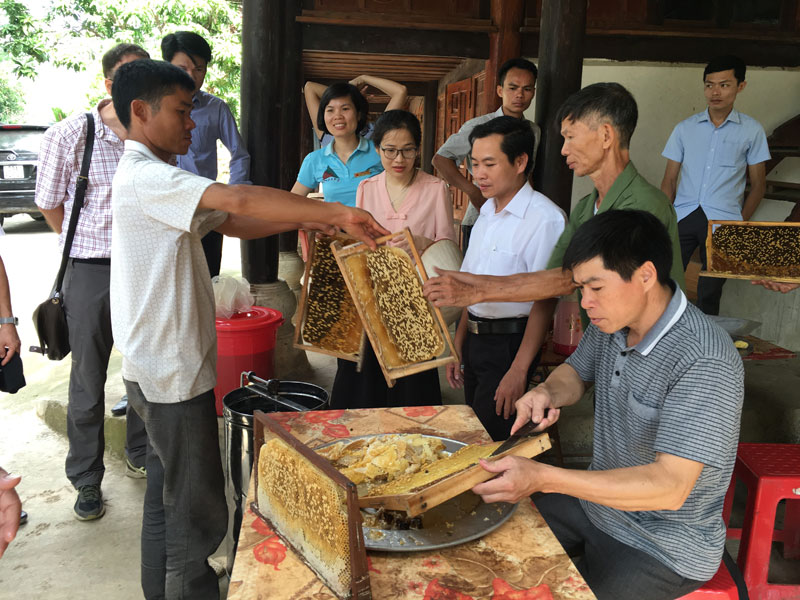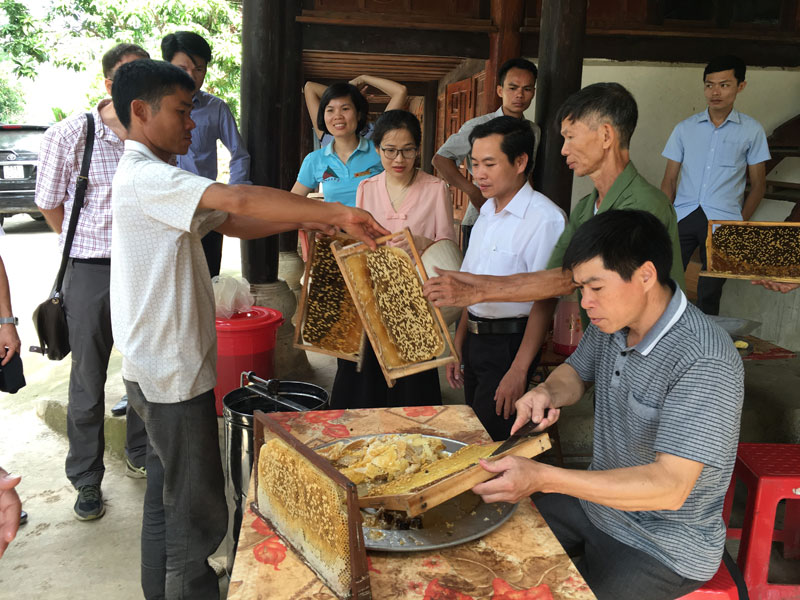
(HBO) – With favourable natural conditions for developing bee keeping, the northern province of Hoa Binh produces thousands of tonnes of honey each year, contributing significantly to the agricultural sector, generating jobs and income for thousands of households. Hoa Binh’s honey will secure a firm niche in the market when it is certified.

Yen Tan beekeeping cooperative, Lac Luong
commune (Yen Thuy), produces honey under traditional method.
Lac Thuy district has over 19,100 hectares of
forests, over half of which are grown with old -age longan, lychee and other
fruit trees. This is a valuable natural source for the honey-making industry.
According to deputy director of the district’s Department of Agriculture and
Rural Development Hoang Dinh Chinh, the honey output of the district reaches
over 100 tonnes each year, equivalent to more than 20 billion VND. In
Luong Son district, the honey industry records 60-70 tonnes per year, raking in
tens of billions of VND in revenues. In some localities such as Yen Thuy, Ky
Son, Lac Son, and Kim Boi, the honey products make up a large proportion of the
total revenues. Many households, cooperatives and cooperative groups in the
province have involved in keeping bees. For example, Hop Dong commune (Kim Boi)
has over 10 beekeeping households, each raising averagely 100-200 beehives and
harvesting 2-3 tonnes of honey. The beekeeping cooperative in Yen Tan hamlet,
Lac Luong commune (Yen Thuy) has 11 members, raking in nearly one billion VND
in revenues in 2017. Meanwhile, Tren hamlet in Tu Do commune (Lac Son) has 17
beekeeping families, raising over 200 beehives. Family of Bui Hai Hoa from Dan
Hoa commune (Ky Son) is breeding 200 beehives with an annual average income of
over 100 million VND.
Various kinds of honey with
different quality are sold in the market at present. To promote the advantages
of the honey industry and generating more jobs for people, it is necessary for
the province to build brands to compete with products from other provinces and
export.
However, fake and low-quality
products are still present in many places, causing damage to honest beekeepers and
customers.
Most recently, the provincial
Department of Science and Technology has collected opinions from scientists to
build regulations for management and use of trademark and selection of a logo
for Hoa Binh honeybee, one of the local competitive farm produce. When
certified, honey keeping and trading households will be issued a code, which
means they have to obey conditions on manufacturing, processing and trading
regulations as well as technical process. Additionally, to protect and develop
honey brands, bee keepers need to ensure quality and pledge to implement
seriously and comprehensively commitments in the certificate of the right to
use brands and ensure national standards on food safety and hygiene.
According to data from the Hoa Binh Provincial Party Committee, the industrial production index for the first six months of 2025 is estimated to have increased by 20% compared to the same period last year. This marks the highest year-on-year growth rate for this period since 2020.
In the first six months of 2025, Hoa Binh province’s export turnover was estimated at 1.145 billion USD, marking an 18.11% increase compared to the same period in 2024. Import turnover was estimated at $ 804 million, a 17.15% increase, which helped the province maintain a positive trade balance.
The lives of the ethnic minority farmers in Tan Lac district have gradually improved thanks to the new directions in agricultural production. This is a testament to the collective strength fostered through the professional associations and groups implemented by various levels of the district’s Farmers’ Union.
With the motto the "product quality comes first,” after nearly one year of establishment and operation, Muong village’s Clean Food Agricultural and Commercial Cooperative, located in Cau Hamlet, Hung Son Commune (Kim Boi district), has launched reputable, high-quality agricultural products to the market that are well-received by consumers. The products such as Muong village’s pork sausage, salt-cured chicken, and salt-cured pork hocks have gradually carved out a place in the market and they are on the path to obtaining the OCOP certification.
In the past, the phrase "bumper harvest, rock-bottom prices" was a familiar refrain for Vietnamese farmers engaged in fragmented, small-scale agriculture. But today, a new spirit is emerging across rural areas of Hoa Binh province - one of collaboration, organisation, and collective economic models that provide a stable foundation for production.
Maintaining growing area codes and packing facility codes in accordance with regulations is a mandatory requirement for agricultural products to be eligible for export. Recently, the Department of Agriculture and Environment of Hoa Binh province has intensified technical supervision of designated farming areas and packing facilities to safeguard the "green passport" that enables its products to access international markets.



